- Home
- >
primordial worlds
[ + links to: Ancient Inhabited Moon - Archives of the Moon - Asteroid Progenitor Planet -
Far Future - Fictional Dates - The Really Old Solar System ]
This page offers guidance to the student of the primeval Old Solar System. We deal elsewhere with the ancient inhabited Moon and the asteroid progenitor planet; here we turn our attention to the rest of the scene...
Harlei: Does your use of "primordial" really mean what it says - "right at the beginning"? Like, when the Solar System was newly formed?
Zendexor: I admit the word does suggest that.
Let's say, at any rate, that we're looking at a distant enough past, that to us Earth humans it would be deep prehistory - really deep: geological ages ago.
Stid: So - millions, rather than mere thousands, of years in the past.
Zendexor: Broadly speaking, yes, but I don't want to be tied to a boundary figure. It's the qualitative mood that counts.
On this page we're out to combine two forms of excitement:
That of delving into antiquity, and that of exploring other worlds.
Both at once!
surviving witnesses
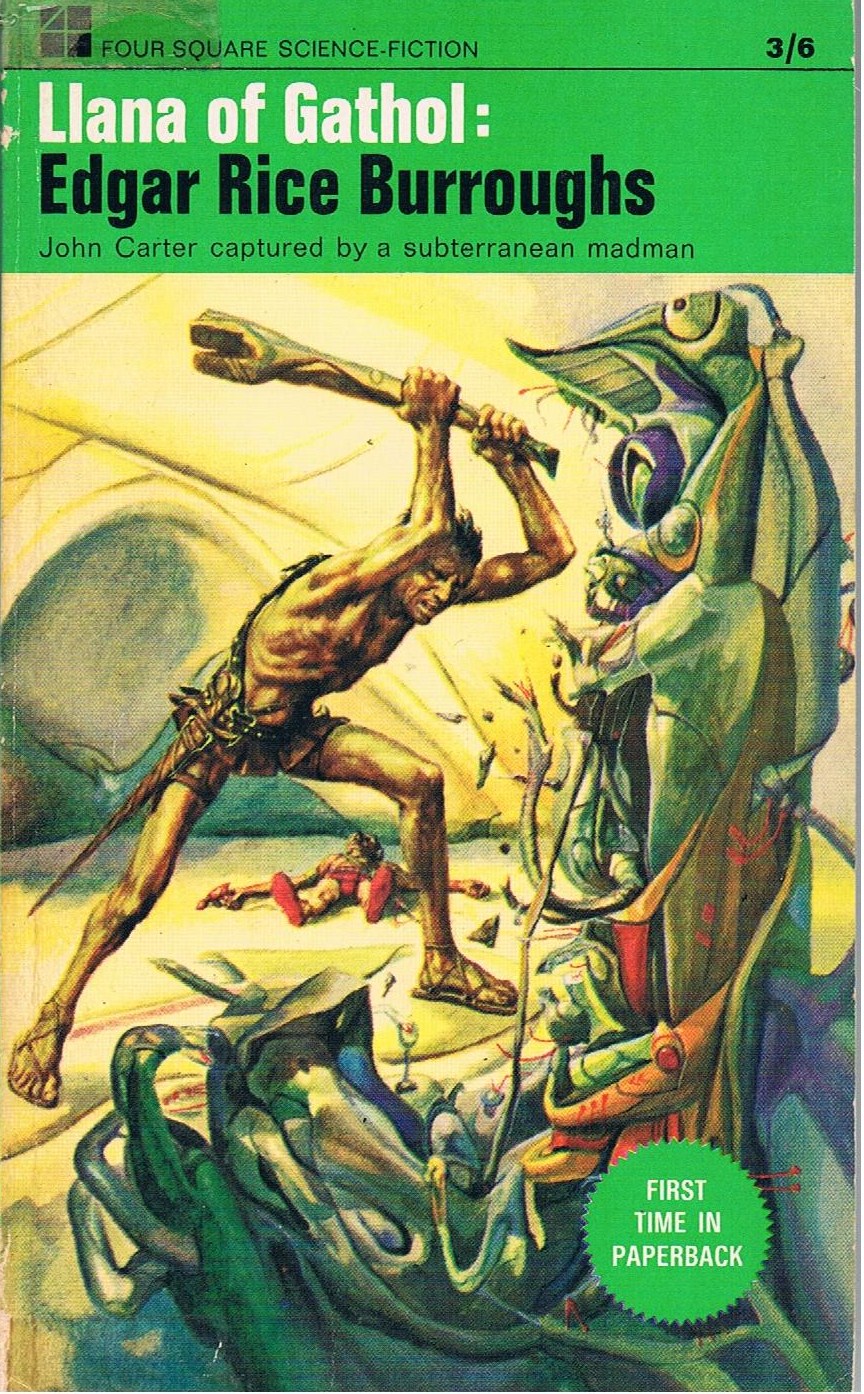 John Carter in the pits of Horz
John Carter in the pits of Horz"What is the meaning of this?" demanded a large man, magnificently trapped. "Who brought me here? Who are you?" He looked around him, evidently bewildered, as though searching for some familiar face.
"Perhaps
I can enlighten you?" I said. "We are in the pits of Horz. I have
been here only a few hours, but if this dead thing on the floor spoke
the truth some of you must have been here for ages. You have been held
by the hypnotic power of this mad creature. His death has freed you."
...The awakened men and women were forcing their way from the chests in which they had been kept... There was a great clattering and tumult as empty chests toppled to the floor. There was a babel of conversation. There were bewilderment and confusion...
A dusty nobleman crawled from one of the chests. Instantly he and the large man who had just spoken recognized one another. "What is the matter with you?" demanded the latter. "You are all covered with dust... Come! I must get back to my guests."
The other shook his head... "Your guests, Kam Han Tor!" he exclaimed. "Did you expect your guests to wait twenty years for you to return."
"Twenty years! What do you mean?"
"I was your guest twenty years ago. You left in the middle of the banquet and never returned."
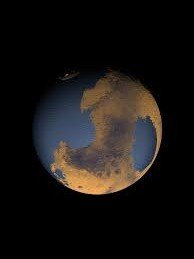
"Twenty years? You are mad!" exclaimed Kam Han Tor. He looked at me and then at the grinning head upon the floor, and he commenced to weaken. I could see it... "My great ship! It was to have sailed from the harbor of Horz the day following my banquet - the greatest ship that ever had been built. Now it is old, perhaps obsolete; and I have never seen it. Tell me - did it sail well? Is it still a proud ship?"
"I saw it as it sailed out upon Throxeus," said the other. "It was a proud ship indeed, but it never returned from that first voyage; nor was any word ever heard of it. It must have been lost with all hands."
Kam Han Tor shook his head sadly, and then he straightened up and squared his shoulders. "I shall build another," he said, "an even greater ship, to sail the mightiest of Barsoom's five seas."
Now I commenced to understand what I had suspected but could not believe. It was absolutely astounding. I was looking at and conversing with men who had lived hundreds of thousands of years ago, when Throxeus and the other four oceans of ancient Mars had covered what are now the vast desert wastes of dead sea bottom; when a great merchant marine carried on the commerce of the fair-skinned, blond race that had supposedly been extinct for countless ages.
I stepped closer to Kam Han Tor and laid a hand upon his shoulder. The men and women who had been released from Lum Tar O's malicious spell had gathered around us, listening. "I am sorry to disillusion you, Kam Han Tor," I said; "but you will build no ship, nor will any ship ever again sail Throxeus." [Llana of Gathol, p37-8]
Stid: Hmm... a memorable fragment, but still only a fragment. I think you'll find the material scarce for what you need on this page. The evidence isn't exactly copious.
Zendexor: That is true, but piecing fragments together is part of the fun. Like trying to study Dark-Age Greece from several thousands potsherds plus two poets...
archival time-visions
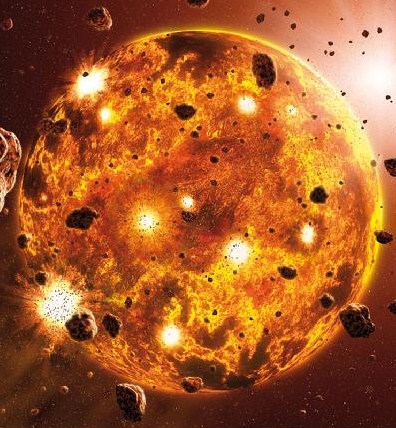
Harlei: We've got a bit more than that to go on. Consider what the narrator of Valeddom gleans from the Mercurian archives! When he eyes the script that wrenches the reader's awareness into the past:
Threads of signification began to lift and spiral at me, reaching for my head; I felt a viscous tug and the walls and shelves around me vanished and I was plunged into a basin - tub - pool - lake - sea - ocean of meaning...
I hovered like a seagull above the waves - but not Earth's. Below a steamy white sky, all around me, stretched Valeddom's primal ocean, the Milb.
I understood whatever I looked at. No sooner did I stare at the bloated, fuzzy red sun that stained the watery horizon, than I knew where I was. That huge sun was new-born. It did not dazzle at all. It was so gentle on the eye, partly because the early Solar System was still dimmed by its cocoon of dust, partly because the thermonuclear solar fires would take millions of years to build up their full blaze. In these relatively mild conditions, liquid water could exist on Mercury, though only just. It was close to boiling point, and I wondered if life had yet appeared here.

I seemed to wait for hours, and during those hours, the sun traversed the zinc-white heaven like a red balloon; Mercury in this remote past age was still rotating. Night followed day. Day followed night. Morning broke, and I turned to see the sun spurting its flaming glow above the other horizon.
A flotilla of dark disc-shapes approached from that direction. They were the living ships, the lannemilb. Gigantic single cells of silicon life. They swam past me and disappeared in the west.
The scene flickered - perhaps I had turned a page - and the picture changed. I immediately knew that millions of years had passed...
Zendexor: Yes, and there follows quite a lot more, as the hapless narrator approaches the dangerous secret of Mercurian history. The trouble is - as Stid no doubt is waiting to point out - this degree of coverage is scarce in the literature.
On the subject of Mercury, for example, if its primordial past is mentioned at all, we're more likely to get a skimpy reference such as this one in Passport to Jupiter:
"There used to be jungles here on this frozen, night-side hemisphere, Pop. When Mercury still rotated on its axis and there were dense clouds to cut down the blazing sunshine."
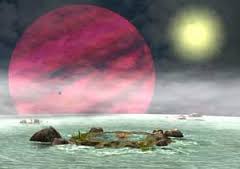
End of reference. Later in the same story, we get scraps of information concerning the distant past of Ganymede and Jupiter:
From the dust, full of broken crystal shards, Carpenter picked up what may have been a piece of petrified wood - relic of a time when Jupiter, looming gigantic on the horizon, had radiated heat, almost like the sun, to a system of living moons.
Harlei: That's a great idea, an epic idea - that Jupiter could once have been a little sun to a family of inhabited moons. I suppose that sort of epic about the Galilean satellites remains to be written. When someone finally does get round to it, we'll be treated to a saga about the four big moons and the relations between their peoples... I can hardly wait.
Zendexor: You may have to wait a long time, Harlei. For the time being the Jovian-moon-epic has to remain listed under tales unwritten, unfortunately. Meanwhile - any more scraps? There's the fragment I mention on the Io page - from The Lotus Engine - in which we get a brief vision of that moon warmed by primordial Jupiter.
Stid: You'd be better off rummaging for scraps of ancient Martian history. It makes sense to hope that they are plentiful - after all, an archetypal Old Solar System Mars does rather lend itself to thoughts about the distant past. Here, let me help you.
We do have a bit of information about ancient Barsoom - such as the story of the Tree of Life in the Valley Dor twenty-three million years ago; and the sea-faring civilization of the ancient Barsoomians a million years ago, before the waters dried up.
Similarly in a few other authors: the Mars of a million years back is brought to life in The Sword of Rhiannon; and the ancient past of the Red Planet is re-evoked in the Kane of Old Mars trilogy.
kane of old mars - pro and contra
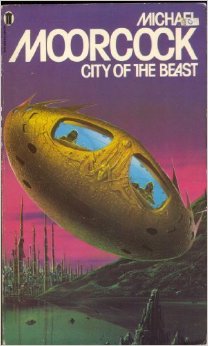
Zendexor: I wouldn't say that last one is quite up to the standard of the Burroughs and the Brackett versions of Mars, though I know of people who like it.
Stid: What don't you like about it?
Zendexor: I didn't say I didn't like it, and I shall probably re-read it sometime, but... there are three reasons why I hesitate to recommend it as a saga of ancient Mars.
First, the people aren't real Martians; either that, or we aren't real Terrestrials - I mean, we're descended from them. We're one and the same. Boring, that COMOLD stuff.
Second, the ancient Mars idea itself was imposed upon the author by the requirements of the publishing world which had decided that contemporary Mars was no longer a believable scene for sword-and-planet adventure. So we don't really get the comparative ancientness as we do for example in that rousing tale of a sea-girt Red Planet, The Sword of Rhiannon, which contrasts ancient and modern Martian civilization. In Moorcock's scene there's no modern Martian civilization for the ancient to be ancient to - if you get what I mean.
Third, I just didn't feel the place to be very Mars-like...
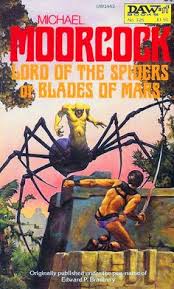
Stid: Psychologically, I find this reaction of yours quite fascinating. Here you are, talking about one particular fabrication, comparing it with other complete fabrications, and complaining that it lacks authenticity...
Zendexor: Well then, this just goes to show that the Kane of Old Mars fabrication is cut off from some linked sense of belonging that helps to thread together the other fabrications.
I stick to my statement: the Kane Mars seems Mars only in name. It's all right as a world of derring-do, but not as that particular planet.
Actually, you know, I reckon it would have been better as a version of Venus! Really, I'm not joking. Though the author was inspired by Barsoom, the Kane trilogy has more the feel and the virtues of Amtor.
I say this because Burroughs' Venus has a less global, less coherent feel to it than Barsoom. Amtor is a world whose cultures have virtually no contact with one another. Its peoples do not possess fliers, and they know almost nothing of lands other than their own, partly because their mistaken ideas about the shape of their world ensure that Amtorian maps are useless.
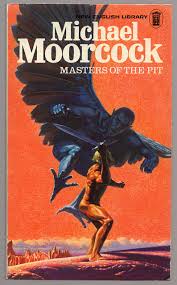
Kane's Old Mars (KOM), likewise, has no general coherent civilization. Nothing to match that of the red men of Barsoom.
You feel in KOM that absolutely anything could happen over the next hill; the place is randomly adventurous. Of course this can be a merit in some stories; but Mars, old or new, has built up such a weight of character by the works of so many authors, that it demands something more true to the main line, as it were.
'truer' fictions of ancient mars
To give your imagination an outing in old Mars, I suggest that rather than rely on KOM you'd get more from the last few chapters of Out of the Silent Planet.
You'll find only brief allusions to primeval times but they're powerful and haunting.
The ruling Intelligence - the "Oyarsa" - of that planet speaks of the great primeval war of the sane planets against the evil Oyarsa of Earth - the world since known as Thulcandra, the Silent Planet. Before those disastrous times, Mars was habitable all over its upper surface - the harandra - and not just down in the cracks or handramits where life is now confined.
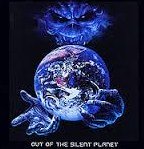
Once we knew the Oyarsa of your world - he was brighter and greater than I - and then we did not call it Thulcandra. It is the longest of all stories and the bitterest. He became bent. That was before any life came on your world. Those were the Bent Years of which we still speak in the heavens, when he was not yet bound to Thulcandra but free like us. It was in his mind to spoil other worlds besides his own. He smote your moon with his left hand and with his right he brought the cold death on my harandra before its time; if by my arm Maleldil had not opened the handramits and let out the hot springs, my world would have been unpeopled. We did not leave him so at large for long. There was great war, and we drove him back out of the heavens and bound him in the air of his own world...
Later, the Oyarsa of Mars relates that his people might, in those terrible days, have turned to spaceflight - but he stopped them. This idea of voluntarily renouncing spaceflight is echoed in a very different work, Red Planet, where a very different author tells us that the Martians in ancient days did have spaceflight, but gave it up.
You see a picture is forming... or to use a posh term, a paradigm...
Harlei: Wise Martians. Anciently wise. That's the picture building up - a great old race with a kind of wisdom that is foreign to Earth thought. You get some of that in No Man Friday. And in the extraordinary powerful combination of forces - the co-operation between plants and animals and intelligent beings - which defeats the Terrestrial hunter-villain in Duel on Syrtis.
Zendexor: Don't forget this page is supposed to be about ancient Mars, not contemporary Mars.
Harlei: In that case let me give documentary proof that Duel on Syrtis sheds light on ancient Mars: by giving us a clue as to when this eco-co-operation began. The contemptuous Terrestrial, Riordan, reflects:
Once, perhaps ten thousand years ago, the Martians had had a civilization of sorts, cities and agriculture and a neolithic technology. But according to their own traditions they had achieved a union or symbiosis with the wild life of the planet and had abandoned such mechanical aids as unnecessary. Riordan snorted.
(Little does he realize that the "union or symbiosis" is not some Green-party-style politico-social mush but a powerful actuality, which he will discover to his cost.)
Stid: But - a mere ten thousand years ago? That's nothing! Mars history should stretch longer than that!
Harlei: In that case behold, I whip out my next document, which should be more to your liking.
They had been driving for half an hour when the hills sloped down into a long, winding valley which was unmistakably an ancient watercourse. Perhaps fifty million years ago, the driver told them, a great river had flowed this way to lose its waters in the Mare Erythraeum - one of the few Martian "seas" to be correctly, if somewhat belatedly, named. They stopped the Flea and gazed down the empty river bed with mingled feelings. Gibson tried to picture the scene as it must have appeared in those remote days, when the great reptiles ruled the Earth and Man was still a dream of the distant future. The red cliffs would scarcely have changed in all that time, but between them the river would have made its unhurried way to the sea, flowing slowly under the weak gravity. It was a scene that might almost have belonged to Earth: and had it ever been witnessed by intelligent eyes? No one knew. Perhaps there had indeed been Martians in those days, but Time had buried them completely.
[The Sands of Mars (1951), p.108-9]
Harlei: There, that's a more satisfactory and realistic time-scale for a lusher Mars - better than the mere one-million-year distance of Martian seas given in Llana of Gathol and The Sword of Rhiannon.
Zendexor: A bit, but not much better - in the light of our knowledge nowadays! Interesting, that figure of fifty million years - interesting that Clarke the realist should, in 1951, have regarded that as a plausible distance pastwards, for open water to have existed on Mars. Scientists of today believe it happened billions rather than millions of years back. Perhaps three billion would be a currently believable figure. So you see, Harlei, the excerpt you chose has helped us chart the change in beliefs about Mars.
(And it reminds us that the date given for the Age of Dinosaurs has changed, too. Nowadays "fifty million years ago" would place us in the Eocene, not the Cretaceous. Another interesting little detail of change of belief.)
Poul Anderson, "Duel on Syrtis" (Planet Stories, 1951); Leigh Brackett, The Sword of Rhiannon (1953); Edgar Rice Burroughs, The Barsoom series (1912-43) including Llana of Gathol (1941, 1948); Arthur C Clarke, The Sands of Mars (1951); Raymond Z Gallun, "Passport to Jupiter" (Startling Stories, January 1951); Robert Gibson, Valeddom (2013); Rex Gordon, No Man Friday (1956); Robert A Heinlein, Red Planet (1949); C S Lewis, Out of the Silent Planet (1938); Michael Moorcock, Kane of Old Mars, comprising City of the Beast (1965), Lord of the Spiders (1968), and Masters of the Pit (1969)
For ideas about ancient Mars: see the OSS Diary for 31st October 2016.
Also the Diary for 5th February 2017, concerning Mars as known to the ancient
Lemurians, in the fragment Ascharia by Clark Ashton Smith.
For the "Young Old Solar System" (YOSS) in general see the Diary for 30th October 2016.
For the ancient lunar empire, see The Archives of the Moon.
The Diary for 19th January 2025 discusses Norse Myth, Mercury and the Primordial OSS.
Rotation returns to Mercury is an extract from Raymond Z Gallun's 1953 tale Give Back a World, in which there are references to a conflict on the innermost planet fifty million years ago between spacefaring Martians and the folk of the asteroid progenitor.
Comment by Lone Wolf (email 28 December 2024) arising from Leslie F Stone's Plutonian names:
...some authors even create a whole fictional history of the Solar System, in which the Moon was once an independent planet (like The Man from the Moon by Otis Adalbert Kline and the second lunar novel of H. R. Romans). I recently came across a similar short story by Leslie F. Stone called The Rape of the Solar System (Amazing Stories, December 1934), in which then recently discovered Pluto turns out to be the asteroid progenitor planet or rather the asteroids came from the remnants of its moons, blown up in the interplanetary war with Luna and Mars (they are said in the story to be the original planets of the yellow and the black race respectively, while the white people came from Pluto, then orbiting between Mars and Jupiter - I wonder if this was not inspired by that story by O. A. Kline that I mentioned, which was published several years earlier, in October 1930, in the same magazine, and in which the origin of the yellow race is also related to the Moon and there is an ancient interplanetary war with Mars). There isn't much detail about Pluto in it though - it's just a setting for the discovery of the chronicle telling the pre-history of the Solar System, but the story contains some nice CLUFFs...
>> Ancient Inhabited Moon - Archives of the Moon - Asteroid Progenitor Planet -
Far Future - Fictional Dates - The Really Old Solar System










































